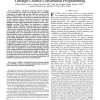Free Online Productivity Tools
i2Speak
i2Symbol
i2OCR
iTex2Img
iWeb2Print
iWeb2Shot
i2Type
iPdf2Split
iPdf2Merge
i2Bopomofo
i2Arabic
i2Style
i2Image
i2PDF
iLatex2Rtf
Sci2ools
122
click to vote
CORR
2010
Springer
2010
Springer
Slow Adaptive OFDMA Systems Through Chance Constrained Programming
Adaptive orthogonal frequency division multiple access (OFDMA) has recently been recognized as a promising technique for providing high spectral efficiency in future broadband wireless systems. The research over the last decade on adaptive OFDMA systems has focused on adapting the allocation of radio resources, such as subcarriers and power, to the instantaneous channel conditions of all users. However, such "fast" adaptation requires high computational complexity and excessive signaling overhead. This hinders the deployment of adaptive OFDMA systems worldwide. This paper proposes a slow adaptive OFDMA scheme, in which the subcarrier allocation is updated on a much slower timescale than that of the fluctuation of instantaneous channel conditions. Meanwhile, the data rate requirements of individual users are accommodated on the fast timescale with high probability, thereby meeting the requirements except occasional outage. Such an objective has a natural chance constrained pro...
Adaptive Ofdma | Adaptive Ofdma Systems | CORR 2010 | Education | Instantaneous Channel Conditions |
| Added | 09 Dec 2010 |
| Updated | 09 Dec 2010 |
| Type | Journal |
| Year | 2010 |
| Where | CORR |
| Authors | William Weiliang Li, Ying Jun Zhang, Anthony Man-Cho So, Moe Z. Win |
Comments (0)

